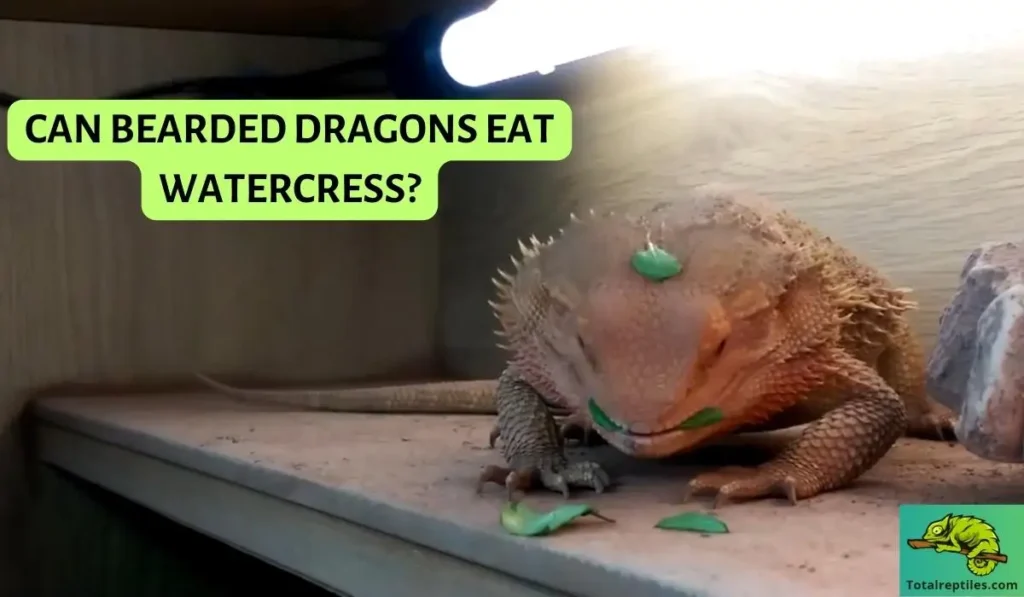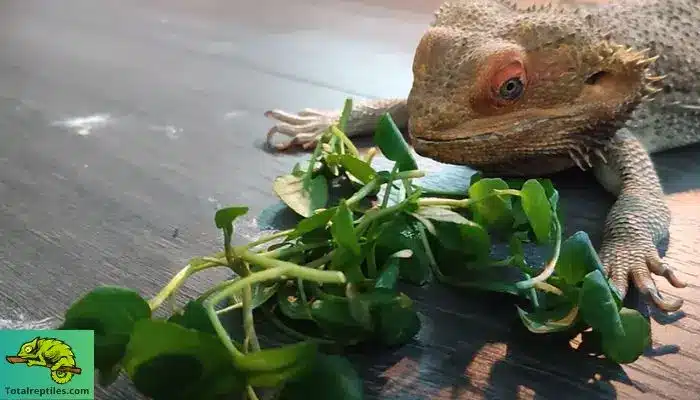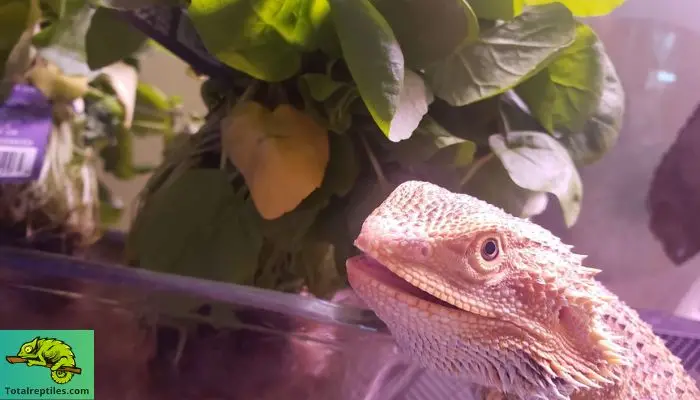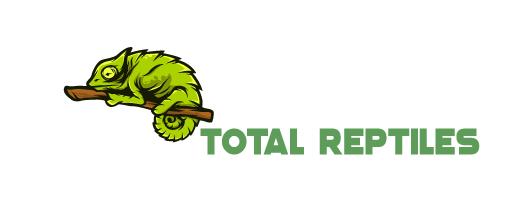The answer is “YES”, they can. But the amount should be limited as it contains a significant amount of oxalate that might cause damage to your beardies’ health if eaten in excess amounts.
Watercress is very rich in vitamins, minerals, and water which are essential for a bearded dragon to grow well.
Though watercress contains some of the nutrients in high content, the question arises: “Can bearded dragons eat watercress?”
But there are many more factors besides this oxalate. This watercress can be an ideal food to cover their body demand, but that also depends on some factors.
Let us discuss the factors and determine what kind of benefits watercress might provide and what damage it can do.

Nutritional composition of watercress
Watercress are leafy green vegetables that are usually grown in natural spring waters. These are from the cabbage family Brassicaceae. Radish, cabbage, and broccoli are also in this family.
Its scientific name is Nasturtium officinale.
Watercress is rich in nutrients like vitamins, minerals & oxalates, and water. The major component of this vegetable is water, consisting of around 90% of its composition.
The nutritional composition of watercress is charted below:
| Components | Amount |
| Water (%) | 90 – 95 |
| Vitamin C (%) | 24 |
| Calcium (%) | 4 |
| Magnesium (%) | 1 |
| Fat (g) | 0 |
| Cholesterol (mg) | 0 |
| Sodium (mg) | 14 |
| Potassium (mg) | 112 |
| Total Carbohydrate (mg) | 0.4 |
| Protein (g) | 0.8 |
| Vitamin D (%) | 0 |
| Vitamin B6 (%) | 0 |
| Phosphorus (mg) | 17 |
| Iron (mg) | 0.75 |
*amount per 1 cup, chopped (34 g)
Benefits of including watercress in a bearded dragon’s diet
Watercresses contain high amounts of oxalate and vitamin C, which are considered to be essential for bearded dragons. Moreover, this green vegetable’s water content also covers its body’s water demand.
The potential benefits of watercress consumption-
- Calcium helps to develop bones.
- Fibrous elements help digestion.
- Anti-oxidants boost the immune system.
- Vitamin C improves the immune system.
- Fiber helps the digestion system and helps to prevent diseases related to digestion.
- Iron and other minerals help to boost the immune system.
Let us discuss the importance of including watercress in a bearded dragon’s diet based on the nutritional demand of your beardie.

Demand for Vitamin A
Bearded dragons generally gather their vitamin A from vegetables.
But supplements are also available in the market to meet their body demand. Supplements for vitamins might pose a risk to their health due to the risk of vitamin intoxication.
Usually, beta carotene present in vegetables is turned into vitamin A by the metabolism of the bearded dragon’s body. The same goes for the supplements also.
But if these synthetic beta carotenes produce an excess amount of vitamin A that is not required for your beardie, then this can be the point of the problem because its body consumes that excess amount of vitamin A despite meeting its body’s needs. This can cause vitamin A toxication.
Adult bearded dragons collect vitamin A from vegetables, and young ones receive that generally from the yolk, which can last up to 6 months of age, and afterward, they begin to eat green veggies.
Demand for Iron
Iron is essential to younger bearded dragons than grown ones because their bones are still developing. Iron is essential for bone development.
Watercress can supply a good amount of iron, though it might not be enough to cover their demand. In this case, an iron supplement is suggested for your young beardie.
Demand for Calcium
Calcium is an essential element for bearded dragons for their growth and development. Generally, they get it from green vegetables.
But there is a problem while eating only watercress because vitamin D3 is a must to absorb calcium in your beardie’s body. As we know from the nutrition facts of watercress, there is no vitamin D3 present in it. So, a vitamin D3 supplement is necessary to absorb calcium properly.
Lack of vitamin D3 and calcium might lead them to diseases like MBD (metabolic bone disease) and others. So this needs to be considered with attention.
Demand for Phosphorus
Phosphorus is also essential for bone development. Though watercress contains phosphorus in small amounts, it might cover its requirements for well-developed bones.
But the level of phosphorus needs to be maintained as an excess amount of phosphorus might prevent calcium digestion. The ideal ratio is 1:1 or 1:2 (P: Ca).
Immune Boost
We have learned from the nutrition facts of watercress that there is a high amount of vitamin C in it. Vitamin C is very important to prevent diseases as it boosts the immune system of your beardie. Also helps to recover if they get affected by any diseases.
Demand for Antioxidants
Antioxidants reduce the chance of being ill. Antioxidants absorb radicals that might affect their health, which is essential for their well-being.
Guidelines for Introducing Watercress to Bearded Dragons
Feeding watercress to your bearded dragon is very easy. We are going to make it simpler for you below:

Step-1: First, you need to select a fresh watercress from the market. Avoid ones that are a day or more old because, as it is a green vegetable, the nutrition decays over time.
Step-2: Clean those fresh watercress with fresh water.
Step-3: Now, tear the leaves with bare hands into small pieces. Avoid using a knife because knife cutting might damage some portions, and those portions turn brownish, which your beardie might not eat willingly.
Step-4: If you are confused about the size into which you need to piece the watercresses, then try to reduce the size to the distance between your beardie’s distance between two eyes.
Adults might not face that many problems, but younger ones might face problems in digestion if the size is bigger than the distance between their eyes.
Age considerations for offering watercress
Watercress is rich in nutrients like vitamins C, and K, calcium, iron, and many other minerals. It also has a high content of oxalate.
These nutrients are essential for bearded dragons of any age but play the most important role in a young bearded dragon’s physical development.
Offering iron and calcium from the watercress is important for baby and juvenile bearded dragons for their bone development and physical growth. So they can be fed watercress regularly. Besides that, sufficient amounts of insects are also needed to meet their body development needs.
But for adults, the amount should be limited. The rich content of oxalate might prevent calcium absorption and lead to MBD (Metabolic Bone Disease)
Adult ones do not require as many vitamins as young ones. They would require more protein at that stage of life.
So, watercress is more important to young bearded dragons than adult ones due to its nutritional fact. The vitamins and minerals help to develop good body growth, skin, and eyesight.
Precautions and monitoring
Watercress is good for health, but due to its nutritional facts and the metabolism system of bearded dragons, sometimes complications might be faced.
Overdosing of watercress might be responsible for:
- Excessive amounts of watercress can improve kidney stones. Watercress contains oxalate, and oxalates can bind with calcium to prevent its absorption and ultimately result in stones in the kidney.
- Oxalate present in the watercress can lead to MBD (Metabolic Bone Disease). Oxalates limit calcium absorption, reducing bone calcium.
So, the amount should be limited because these could happen to your beardie if you overfeed them watercress. This should be kept in your concern while planning your beardie’s diet plan.
Conclusion
After learning all these about bearded dragons and the nutritional facts of watercress, we can say that bearded dragons can eat watercress.
Bearded dragons can benefit from watercresses as they contain rich content of vitamin C, vitamin K, and other necessary minerals. But need to be fed in limited amounts.

